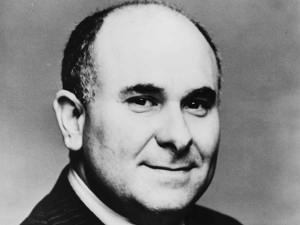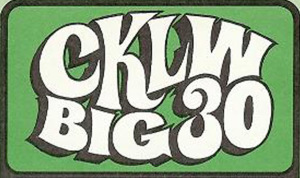 From the MCRFB news archive: 1974
From the MCRFB news archive: 1974
LOS ANGELES — If the recording industry will shorten records, Paul Drew, national program director for the powerful RKO General chain of Top 40 operations coast-to-coast, claims his stations will feature longer playlists.
“I can guarantee that playlists will get longer if the records are shorter,” he says.
Drew set a off a storm a week ago when he was accused of stating that his stations would limit records to those less than there-and-a-half minutes long.

But Drew said the original idea came from Herb McCord, general manager of CKLW in Detroit. McCord admits the idea jelled during meetings at the recent seventh annual Billboard Radio Programming Forum in New York. McCord and his programmer Bill Hennes had long discussions with Drew, who still consults CKLW-AM, regarding working and reworking a programming “clock.”
“It has gotten to the point where the Top 40 format clock doesn’t work anymore because of the lengths of records today,” McCord says.
“I’m not making any declaration that we won’t play any record over three-and-a-half minutes long, but if it’s longer it’ll have to be like the second of Christ.”
McCord points out that records by Elton John and other artists of similar stature would, of course, be considered for airplay regardless of length, but “one of the factors we will weigh heavily in regards to the exposure of new records is the length.”
“If the record industry wants exposure of new records on CKLW-AM, particularly product by new and coming artists, they’ll have to make the records shorter,” he says.
Paul Drew, interviewed personally, says he thinks the long record is creating a vicious circle and mentions the rotation pattern used by most RKO General stations; to wit, the longer the records, the less chance of playing more records. He also points out that “Bill Drake cleaned up Top 40 radio nine years ago when he reduced the commercial load at KHJ-AM. We’re not playing any more commercials now than KHJ-AM did nine years ago. Yet, because the records are longer, people think we are.
“Another problem involved is that the cost of radio time has not kept pace with inflationary trends across the nation. Radio today is a damn good buy! We cannot, however, reduce commercials any further.”
Thus, it must be the music that must be flexible.
“I don’t say that recording artists have to go back to the old way of records . . . back when the Beach Boys released records 2:15 minutes long and when the early Beatles had short records.
“And I would encourage artists to continue making long album cuts. But the singles that go on jukeboxes and on the radio should be shorter.”
Drew said that Mick Jagger told him last week that henceforth the B sides of his singles would not be available on any of his albums. Elton John is doing the same thing. (A phone call to MCA Records reveal that John has had the last few B sides exclusively to his singles. Bad Company is doing the same thing now).
Obviously, Drew says these artists are working to help the singles industry . . . “here’s a novel way to rejuvenate singles sales and I think it’s a great idea.”
Drew thinks a 3:30 limit on singles is realistic. “Most program directors of Top 40 stations will tell you that their hot clocks are hinged to a three minute record.
 “I’ve been asking people in the record industry for a long, long time to please make shorter records. Obviously, if a given record is four minutes long and is a hit, we’ll play it. But we don’t let the air personalities run our radio stations and for those record companies who say they have no control over their artists and its not their fault how long the records are, I would think the economics of the record business would entail them having a say about the length of records.”
“I’ve been asking people in the record industry for a long, long time to please make shorter records. Obviously, if a given record is four minutes long and is a hit, we’ll play it. But we don’t let the air personalities run our radio stations and for those record companies who say they have no control over their artists and its not their fault how long the records are, I would think the economics of the record business would entail them having a say about the length of records.”
Herb McCord claims that today that there’s hardly room for 10 records an hour. “Five years ago, we used to play 20 records in an hour. Logically, if records average four minutes long each and you have 48 minutes an hour for music, you can only play 12 an hour. If the records average three minute each, you can play 16 an hour, leaving twelve minutes for commercials.
“The playlist is being forced shorter and shorter by the longer records and it’s not our fault.
“Now if a ‘Hey Jude’ comes out, obviously we will play it. But length of records will be a factor in determining whether they get aired on CKLW-AM or not.”
And CKLW-AM will be strongly reluctant to editing records personally. “Who’s CKLW-AM to chop down an Elton John (record)? We just won’t do it.”
Not every radio change is adverse to the longer record nor willing to make definite “not play” statements about long records.
For instance, Rochelle Staab, national music director of Bartell Radio, says that length won’t be a factor. “You just have to make exceptions all the time. For instance, there’s a five minute record out now. You can’t construct a radio station around a three minute record. You’re there to serve the public, not to serve a hot clock.” And the public deserves to hear hit records regardless of the length, she says. END
(Information and news source: Billboard; September 7, 1974).
![]()